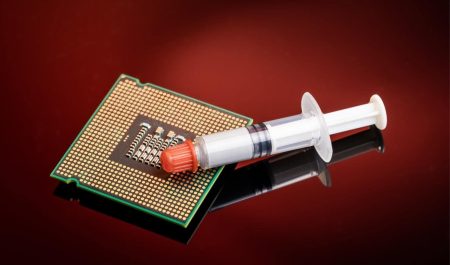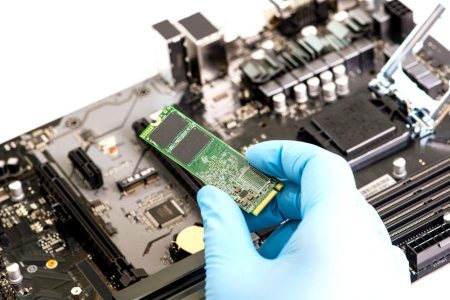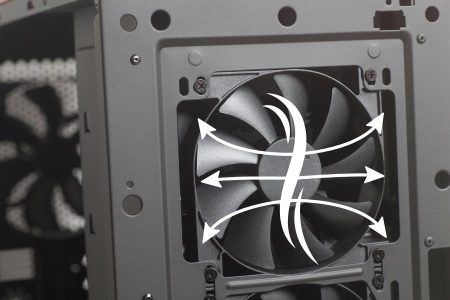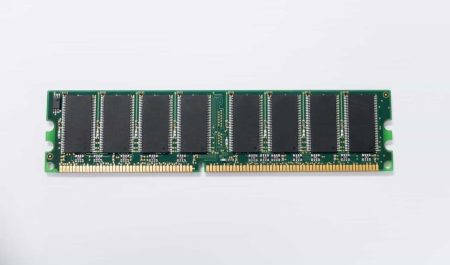Both air and liquid CPU coolers work on the same thermodynamic principle, which is convection. This means that both have a similar purpose but different ways of performing that same action for efficiency and robust performance. If you explore behind the scenes of CPU cooling, the air coolers type is a cheap solution to get going for a simple computer setup, while liquid cooling has greater absorption of heat from the CPU to redistribute it away from the hardware and make a relative silent system for a relaxed, noise-free working atmosphere.
In regards to liquid cooling, you can choose an AIO all-in-one CPU cooler instead of an open-loop water cooling kit. This is because the All-in-One CPU Cooler is a perfect choice for simple yet completely satisfying liquid cooling PC requirements with less labor and less challenge than custom CPU coolers. The reason for AIO CPU cooler’s popularity is they are manufactured as a single unit by OEMs which is the reason they are more inexpensive than the open-loop cooling systems that come with multiple components.
On the other hand, when comparing the benefits and drawbacks of CPU liquid cooling vs air cooling. The straightforward outcome resulted as follows: In advantage, liquid coolers are extremely effective at reducing heat, making them ideal for high-end gaming rigs, whereas CPU air coolers are less expensive and better suited for average PC builds probably usable for entry-level gaming setups and office rigs.
This also means liquid cooling is expensive as a drawback, which many new gamers and PC builders drop for simple and traditional heat sinks and air coolers due to their simple mechanism. In addition to drawbacks, air coolers are also having a major disappointment of creating noise while reducing heat from the processor.
Although greater thermal energy is only escalated while doing intensive tasks like encoding or decoding, and rendering graphics files, which many times exceed over safe operating temperatures of a processor to throttle air coolers. However, if you are getting some quick beats, the comparison is that much simple, you can get some advantages and disadvantages from each type of liquid cooling and air cooling.
How Important Is A CPU Cooler?
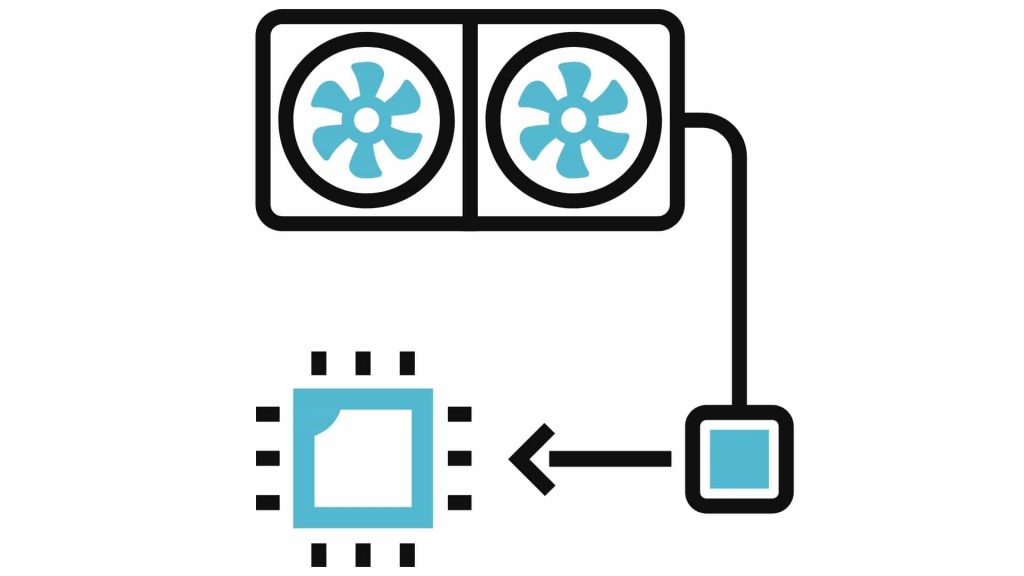
To begin exploring everything from the beginning with the fundamental steps, let’s start with some knowledge base. A CPU cooler is an important part of a PC, that keeps your computer’s central processing unit (CPU) cool while you’re doing some computing. This is significant because if the CPU becomes too hot, it can damage the computer. So often, a CPU cooler is required to keep your system running with normal tasks.
There are two main types of CPU coolers: air and liquid. Both come in a variety of shapes and sizes and differ primarily in terms of functionality rather than purpose. Air coolers circulate cool air over the CPU with help of a heatsink mounted on a powerful fan, whereas liquid coolers circulate a liquid (usually water or an antifreeze/water mixture) around the CPU with pipes to remove heat.
If you must choose, keep in mind that a good CPU cooler can help your computer run faster and more reliably by preventing the components from overheating. When your computer’s processor becomes too hot, it can cause it to freeze or crash. Taking this into account, the CPU coolers help to extend the life of your computer’s components. So, when selecting, you must decide whether you want air or liquid cooler. Air coolers are typically less expensive than liquid coolers, but they are not always silent. While the best liquid CPU coolers are exceptional at their jobs and operate quietly and they can show temperatures with the addition of a screen but are a little heavy on the wallet.
Why We Need a CPU Cooler in PC
Every processor makes use of the Integrated Heat Spreader (IHS), which is the name of the metal lid of a CPU that usually connects with a CPU cooler when a thermal paste is applied over the surface for proper connection that can help with the transferring of heat without risking a fraction. In such a case, if you ain’t employ a CPU cooler, your PC could get overheat the processor which can damage or even destroy the whole system.
To understand the requirement, a processor is made of a silicon chip hosting multilayered transistors that make the wafer of a chip that we know as the primary logic chip (computer processor) which is used in every computer or computer-based device to perform countless tasks and handle workloads of commands both form software-based applications and direct user inputs. In a nutshell, computer chips, particularly CPUs, are tiny but massively powerful by hosting multiplex cores and threads in a tiny form.
And because of the high performance of processor chips, a tremendous amount of heat is generated that is dispatched from the surface that we know as (IHS), which can not be bare by itself but needs a path to convey heat away from the processor. Just as superheroes say; greater powers come with greater responsivity! This idiom is perfect for expressing (a CPU fan or CPU liquid cooler) as a necessity for any computer in the current age of technology.
Your computer must need a cooler to continuously work at a stable temperature and not lag your tasks by massive heat output. In another manner, your usage can overheat the components such as CPU, GPU, RAM, and chipsets, which could cause slower progress and even random shut down if there is a malfunctioning PC cooling system.
You should consider these two reasons why we need CPU coolers. One is that processors generate a lot of heat and the second reason is cooling helps improve performance. You have a vast choice of many different types of CPU coolers for the price to performance factors, but all of them serve the same basic purpose: to keep the processor cool.
How Do CPU Coolers Work
The typical air-based CPU cooler consists of a fan and a heat sink. The fan draws air in from outside of the computer case and blows it over the heat sink. The heat sink then dissipates the heat from the CPU which cools down the processor. In opposite, liquid CPU coolers use a water pump and water block to help keep the CPU cool. To explore it further, we have explained both types in detail.
Explaining: How CPU Fan Works
Inside of a CPU cooler is several components that work together to keep your processor cool. There are three components: a heatsink, heat pipes, and a fan. Heatsinks and heat pipes are typically made of metal (with high thermal conductivity) such as aluminum alloy and copper to responsibly absorb the heat from the processor and the connected fan on top blows air over the heatsink to dissipate the heat. In between the CPU’s heat plate and CPU fan, a thermal compound is applied for greater conductivity between the processor and heatsink, helping to transfer the heat from the processor to the heatsink more efficiently.
If you say; Is CPU fan necessary? Yes, it is a necessary element for basic computer builds. As most modern CPU fans have variable speed controls, which help with sensory hardware to detect heat and run efficiently and quietly for the majority of the time. The motherboard temperature monitors have played an important role in basic model fan speed and can increase or decrease in response to activity and load as the computer runs, depending on the manufacturer of your CPU and cooler features.
Explaining: How Does A CPU Liquid Cooler Work
When it comes to high-end desktop processors, liquid cooling is a worthy solution to keep all the performance on the table and not lose single fame out of your gaming hardware particularly when using a CPU and GPU liquid cooler. There are two types of liquid coolings: First, All-in-One (AIO) coolers also known as closed-loop coolers, and secondly, custom cooling loops also known as open-loop coolers. These two have further classification. different design and components, but have the basic principles of using liquid to cool the CPU.
As previously stated, the air coolers make contact with thermal compounds in the space between the CPU plate and the thermal heat sink; similarly, the metal surface of the baseplate is part of the water block, which is intended to be filled with coolant. The process begins with a base plate that is connected to the CPU’s IHS with a layer of thermal paste, much like air cooling. This improves heat transfer between the two surfaces, and the coolant absorbs heat from the baseplate as it moves through the water block.
It then works its way through the tubing and reaches the radiator, where single or multiple fans on top of the radiator cool down the liquid and make it loop back to the water block for continuous cooling. If you are looking for the latest flagship CPUs from Intel 13th-gen Raptor Lake and AMD Ryzen 7000 Series (Zen 4) that can run at super impressive speeds and generate a lot of heat, liquid cooling makes a lot of sense in such hardware.
As it helps with cooling the gaming hardware more effectively and dispatch the warm liquid with the help of a relatively big radiator than the fan cooler. It can be mounted near the top, front, or rear of your PC case and equip one or more than one fans that help it remove the heat. However, if you’re building a low-cost PC or a computer without a high-end CPU, liquid cooling becomes more of aesthetic luxury, or what we call over expenditure of your rig.
Differences: Liquid Cooling Vs Air Cooling
CPU Liquid Coolers
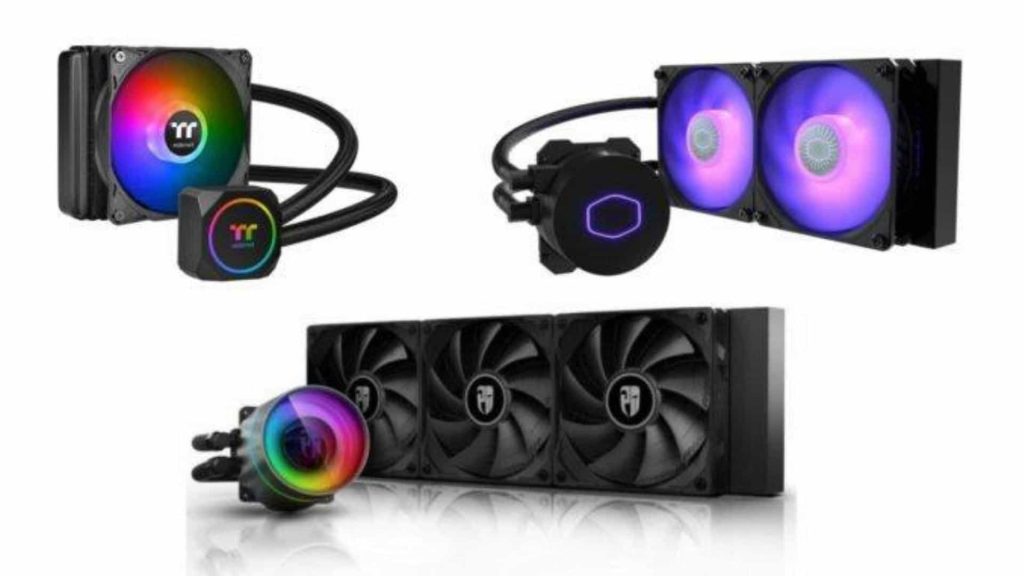
There are many benefits to using a water CPU cooler over air coolers. One of the main benefits is that water coolers can be much more efficient at cooling CPUs. This is because water has a much higher thermal conductivity than air, meaning that it can transfer heat away from the CPU faster. Additionally, water CPU coolers often come with built-in radiators, which allows them to dissipate heat more effectively.
Another benefit of using a water CPU cooler is that they are often quieter than air coolers. This is because water CPU coolers use radiators to circulate the liquid, rather than relying on noisy fans to move air around. Finally, many water CPU coolers come with RGB lighting, which allows you to customize the look of your computer’s cooling system.
There are several components that make up a Water cooler. The main components are the pump, radiator, and CPU block. The pump is responsible for circulating water through the system, while the radiator helps to dissipate heat from the CPU. The CPU block is attached to the top of the processor and helps to transfer heat from the chip to the water. The different parts of a CPU water cooler can be purchased separately or as part of a kit. If you’re looking to build your own system, there are many different options available online.
Which Type You Preffer: Closed Loop CPU Cooler Or Open Loop Water Coolers
With the rise of CPUs that have TDPs (thermal design power) over 100 watts, traditional tower coolers or air coolers are no longer capable of cooling these processors adequately. This has led to the development of all-in-one liquid CPU coolers, which combine a water block with a pump and radiator in one unit. These closed-loop CPU coolers are easy to install and maintain, and they provide the best possible cooling performance for CPUs with TDPs over 100 watts.
Closed-loop CPU coolers are often considered the best option for cooling a processor. This is because they have a number of advantages over other types of CPU coolers. One of the main advantages is that they are more efficient. Closed-loop CPU coolers can dissipate more heat than traditional CPU coolers, which means they can keep your processor cooler and run faster.
Another advantage of closed-loop CPU coolers is that they are more reliable. Because they have fewer parts, there is less that can go wrong with them. They are also easier to install and maintain than traditional CPU coolers. This makes them a good choice for people who are not very experienced with computers or who don’t have a lot of time to spend on maintenance tasks. Finally, closed-loop CPU coolers are often quieter than other types of CPU coolers.
CPU Air Coolers
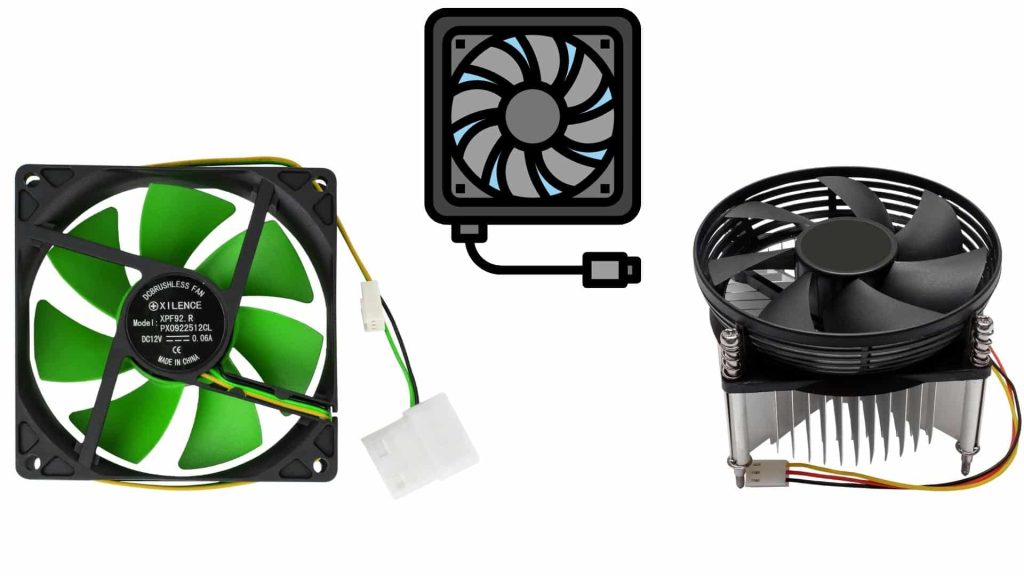
Air CPU coolers are a great way to keep your computer’s processor running at optimal temperatures. By using a fan to blow air over a heatsink that is in contact with the processor, the cooler can reduce the temperature of the processor by up to 10 degrees Celsius.
There are a variety of air CPU coolers on the market, and each has its own advantages and disadvantages. Some coolers come with built-in RGB lighting, while others have more powerful fans that make less noise. Some coolers also include thermal paste, which can help improve the cooling performance.
When choosing an air CPU cooler, it’s important to consider the power requirements of the fan. Some fans require an extra four-pin power connector from the motherboard, while others can be powered by the CPU’s stock fan header. There are many different types and brands of CPU air coolers on the market, and it is important to choose the right one for your computer.
Some factors to consider when choosing a CPU air cooler include the size of your case, the type of CPU you have, and how much noise you are willing to tolerate. The most important part of a CPU air cooler is the fan. The fan pulls air through the heatsink, which dissipates heat from the CPU. The size and shape of the fan can affect how well it cools the CPU. Another important factor is whether or not the cooler comes with a heat sink.
Which CPU Cooler Type To Choose
When it comes to choosing a CPU cooler, there are two main types: air coolers and water coolers. Air coolers are less expensive, but water coolers tend to be more efficient. So which one should you choose?
1. CPU Air Coolers
Work by using fans to blow air over the hot parts of the CPU, which dissipates the heat and keeps the CPU cool. They are usually cheaper than water coolers, and they are easier to install. However, they can be noisier than watercoolers, and they don’t always work well with overclocked CPUs.
1. Air CPU coolers are typically much cheaper than liquid CPU coolers.
2. They’re also usually much easier to install, requiring no additional tubing or fittings.
3. Many air CPU coolers come with RGB lighting, which can add a bit of flair to your PC build.
4. They also consume significantly less power than liquid CPU coolers, making them ideal for builds with limited power budgets.
2. Waterblock Coolers
The waterblock coolers work by using a radiator and water pump to circulate cold water through tubes that run over the hot parts of the CPU. This cooling system is more efficient than air cooling, and it can also keep overclocked CPUs stable.
1. When it comes to cooling your CPU, there are a variety of options to choose from. Air CPU coolers are the most common, but water CPU coolers are becoming more popular, especially among gamers and overclockers.
2. There are several advantages of using a water CPU cooler over an air cooler. First, liquid cooling is more efficient at dissipating heat than air cooling. This means that your CPU will run cooler and perform better when using a water cooler.
3. Second, water coolers are much quieter than air coolers. If you’re looking for a quiet PC build, a water cooler is a way to go.
4. Third, water coolers offer more customization options than air coolers. Most water coolers come with built-in RGB lighting that can be customized to match your system’s color scheme.
5. Water CPU coolers can often be overclocked without issue. Additionally, they are less likely to cause damage to your CPU than air coolers.
3. Closed-Loop Coolers
The closed-loop CPU cooler is a self-contained device that attaches to the processor and draws heat away from it. The most common type of closed-loop CPU cooler is AIO or all-in-one. This style of cooler typically contains a pump, radiator, and fan inside the unit. It is easy to install and does not require any additional components. Closed-loop CPU coolers are available in both air and water-cooled versions.
1. Closed-loop CPU coolers have a number of advantages over their open-loop counterparts.
2. They are easier to install, and are less likely to cause leaks, which makes them the best choice for new gamers.
3. Closed-loop coolers are also more efficient and can provide better performance than open-loop coolers.
4. Finally, they are also quieter than open-loop coolers, making them a better choice for those who want a quiet system.
Things to Check Out Before Buying CPU Cooler
When it comes to PC gaming, the one component that you don’t want to neglect is the CPU cooler. A good CPU cooler can keep your system running smoothly and help prevent any thermal throttling. If you’re in the market for a new CPU cooler, here are some things to keep in mind:
1. Installation Process
All in One or Closed Loop CPU Coolers are some of the easiest coolers to install, and they typically come with clear instructions. If you are not familiar with how to install a CPU cooler, it is important to read the instructions carefully.
Another thing to keep in mind is that some CPU coolers require more space than others. Make sure that your case has enough room for the cooler before you purchase one. If you are not sure whether or not your case has enough room, take a look at the specifications online or contact the manufacturer.
Finally, when choosing a CPU cooler, be sure to consider your budget. There are many different CPU coolers on the market, and some are more expensive than others. Choose the one that fits your needs and your budget.
2. Price You Can Afford
When looking for a CPU cooler, there are a few different types to choose from. The most popular are air coolers, water coolers, and all-in-one or closed-loop coolers. They all have their own benefits and drawbacks, but which one is the best for you depends on your needs.
Air coolers are the cheapest option and are good for people who don’t want to spend a lot of money or who already have a water cooling system. However, they don’t work as well as water or all in one cooler and can’t handle as much heat.
Waterblocks are more expensive than air coolers, but they work better and can handle more heat. They’re also quieter than air coolers. Even though liquid coolers are an expensive option, they’re also the most efficient and quietest option since they have a distance radiator, with multiple fans to make cooling more efficient than the single fan air coolers.
3. Noise From PC Fans
There is a lot of debate when it comes to CPU coolers and which ones make the most noise. Some people swear by air coolers, while others prefer water coolers. In big rigs, there are also all-in-one or closed-loop coolers and open-loop cooling systems that have been gaining in popularity in recent years. So, which one is the best option when it comes to noise?
Air coolers are generally considered to be louder than waterblock. This is because air has to be forced through the heatsink, which creates more noise. In our opinion, all-in-one and open-loop coolings are usually a bit quieter, as the liquid is already circulating and doesn’t need to be forced through anything. However, this isn’t always the case, so it’s important to do your research before making a decision.
4. Temperature Regulation
CPU coolers are one of the most important pieces of computer hardware. They work to keep the CPU from overheating, which can cause damage to the component. CPU coolers come in a variety of shapes and sizes, but all serve the same purpose: to regulate the temperature of the CPU.
One common type of CPU cooler is the heatsink and fan. The heatsink is a metal block that sits on top of the CPU and absorbs heat. The fan blows air over the heatsink, cooling it down. Other types of CPU coolers include water-cooling systems and they have further two types; closed loop-cooling systems and open-loop cooling systems.
All these cooling solutions are good in their respective category. But we will recommend water coolers especially, all-in-one (closed-loop) coolers which are also the most popular in new gaming rigs because of their amazing performance with new high-end processors that generates a lot of heat.
No matter what type of cooler you have, it’s important to make sure that it’s properly installed and check it with PC software. If it’s not installed correctly, it won’t work properly and may even damage your computer.
Final Verdict
CPU coolers are responsible for the temperature regulation of the processor. If the cooler is not functioning properly or is not installed correctly, the processor can overheat and be damaged. Now you have to know, how a CPU cooler works and what are the differences between liquid cooling Vs air cooling systems. This is necessary to ensure optimal performance and prevent damage to the CPU, which we are sure you are aware of keeping the cooler clean and free of obstructions.



